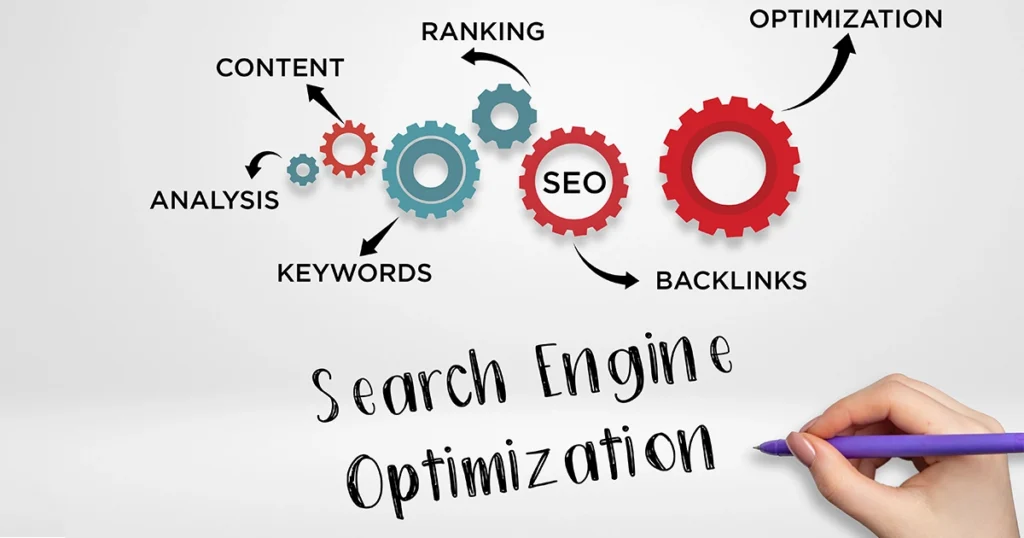Backlinks are one of the strongest ranking signals in search engine optimization, and every business, whether a startup or an established brand, needs them to thrive online. They not only help your website climb higher in Google’s search results but also drive referral traffic, boost credibility, and strengthen your overall digital footprint. Without a solid backlink strategy, even well-written content may struggle to gain visibility, leaving your competitors ahead in the race.
Our professional SEO services are designed to help businesses build high-quality backlinks that fuel long-term growth. From guest posting and digital PR to outreach campaigns, we focus on ethical and proven strategies that improve authority, increase rankings, and generate more leads. With expert guidance, you won’t just attract links, you’ll build lasting relationships that position your brand as a trusted leader in your industry.
What Are Backlinks?
Backlinks are links from one website to another, and they act as endorsements in the eyes of search engines. Think of them as digital votes that tell Google your content is valuable and worth showing to users. When multiple reputable sites link to your content, it signals credibility, making your site more likely to rank higher. According to a Backlinko study, the top-ranking page on Google has an average of 3.8x more backlinks than those in positions two through ten. Without backlinks, even high-quality content can remain buried in search results. This makes them one of the most important off-page SEO elements for long-term success.
Understanding Domain Authority
Domain Authority (DA) is a ranking score created by Moz to predict how well a website might perform in search engines. It ranges from 1 to 100, with higher scores indicating greater ability to rank. DA is influenced by the number and quality of backlinks pointing to a site. For instance, websites like Forbes or HubSpot have DA scores above 90, and backlinks from them can drastically boost your site’s credibility. For small businesses, focusing on quality links from industry-related websites is better than chasing hundreds of low-authority links. Increasing your DA over time builds trust with both search engines and potential customers.
How Backlinks Strengthen Your Website’s Authority
Backlinks don’t just improve SEO, they build your brand reputation too. When authority sites reference your content, it shows that you’re an expert in your niche. This boosts both visibility and credibility, making it easier for customers to trust your business. Backlinks also provide referral traffic, meaning visitors come to your website directly from the linking site. The benefits include:
- Improved rankings on search engines for competitive keywords
- Increased organic traffic from relevant audiences
- Steady referral traffic from partner or industry sites
- Better brand recognition and thought leadership positioning
- Stronger online visibility compared to competitors
Proven Ways to Get Backlinks for Small Businesses

1. Guest Posting
Guest posting is one of the most effective backlink strategies. It involves writing valuable content for another website and linking back to your own. To maximize results, choose sites with high DA and engaged audiences in your niche. Quality matters more than quantity—publishing one guest post on a top authority site can be worth dozens of posts on smaller blogs. Always ensure the content is original and tailored to the host site’s audience.
2. Broken Link Building
Websites often contain outdated or broken links, creating opportunities for smart marketers. You can find these broken links using tools like Ahrefs or SEMrush, then suggest your content as a replacement. This benefits the website owner by improving user experience while giving you a valuable backlink. Since most site owners want to fix broken links, this strategy has a high success rate when approached politely and professionally.
3. Discover Unlinked Mentions
Sometimes websites mention your brand or products without linking back. These “unlinked mentions” are opportunities to turn mentions into backlinks. Use tools like Google Alerts or Mention to track these cases. By reaching out to the publisher and requesting a link, you often secure an easy win since they already acknowledge your brand. This strategy is particularly effective for growing companies and local businesses.
4. Create Link-Worthy Content
Content that naturally attracts links is key for long-term backlink success. This includes original research, in-depth guides, trend reports, and problem-solving resources. Data-driven articles and visual content like infographics are especially powerful. The more useful and shareable your content is, the higher the chances other sites will link to it. Over time, such content can become evergreen, continuously generating backlinks without extra effort.
5. Get Featured in “Best Of” Articles
“Top 10” or “Best” articles are popular across many industries, and being included can give your website both visibility and backlinks. Identify existing listicles in your niche and reach out to their publishers. Provide proof of your credibility—such as awards, case studies, or testimonials—to increase your chances of being featured. These backlinks often bring referral traffic too, since readers are actively looking for recommendations.
6. Leverage Infographics
Infographics are highly shareable and serve as excellent link-building tools. By visualizing data in a clear and engaging way, you make it easier for others to use your content as a resource. Ensure your infographic is easy to embed and encourage sharing across blogs, social media, and newsletters. Adding your logo and website link at the bottom ensures you get credit no matter where it’s posted.
7. Use HARO (Help a Reporter Out)
HARO connects journalists with sources for their stories. By providing expert insights, you can earn backlinks from high-authority news websites. Since journalists are often on tight deadlines, responding quickly and providing clear, valuable answers is critical. Even one backlink from a reputable publication like Business Insider or The Guardian can significantly boost your site’s authority.
8. Publish Comprehensive Guides
Long-form guides that thoroughly cover a topic tend to become go-to resources in your industry. For example, a detailed “Beginner’s Guide to Digital Marketing” can attract links from blogs, forums, and even educators. The more detailed, updated, and actionable your guide is, the more likely it will be cited as a trusted resource. Over time, these guides help position your brand as an industry authority.
9. Partner with Business Associations
Joining associations, chambers of commerce, or trade organizations often comes with a backlink from their directory. These links are both authoritative and niche-relevant, making them valuable for local SEO. They also provide networking opportunities with other businesses, which can lead to collaborations and more backlinks in the future.
10. Apply the Skyscraper Technique
The skyscraper technique involves finding top-performing content in your niche and creating a better, more updated version. Once published, you reach out to the sites linking to the original article and suggest yours as an alternative. Since your content is superior, many will switch their links to your site. This method is time-intensive but delivers long-term, sustainable backlinks.
Why Quality Matters More Than Quantity
While having many backlinks can look impressive, search engines prioritize quality. A single backlink from an authority site like Harvard.edu carries more weight than dozens from unknown blogs. Low-quality backlinks may even harm your SEO if Google interprets them as spammy. Quality backlinks bring real referral traffic, enhance brand trust, and protect your website from ranking penalties. Always focus on relevance, authority, and natural link growth.
Building Relationships for Backlinks
Backlinking is as much about building relationships as it is about strategy. By connecting with bloggers, influencers, and journalists in your field, you can create partnerships that lead to natural backlink opportunities. This can be achieved through collaborations, interviews, co-authored content, or active social media engagement. Genuine relationships ensure you’re seen as a trusted resource, not just someone looking for links.
Backlinks Take Time to Build
Link building is a long-term process that requires patience and consistency. Results rarely happen overnight. Most strategies, like guest posting and content creation, take weeks or months before you see measurable changes in rankings. Search engines prefer gradual, natural growth, so slow and steady efforts yield better results than quick, spammy tactics. Businesses that consistently invest in backlinking see compounding results over time.
Using Social Media for Backlink Growth
While social media links are typically “nofollow,” they play an indirect role in SEO. Sharing your content widely increases its visibility, making it more likely that bloggers, journalists, or businesses will link to it. Platforms like LinkedIn, Twitter, and Pinterest are especially effective for sharing blog posts, infographics, and guides. Social media also helps build brand recognition, which makes outreach easier when requesting backlinks.
What Makes a Backlink Valuable?
A backlink’s value depends on several factors that search engines use to measure trust and relevance. Not every link carries the same weight, some can significantly boost rankings, while others may have little to no impact. High-value backlinks usually come from authoritative websites in your niche, placed naturally within content, and supported by relevant anchor text. These types of links not only improve search rankings but also drive qualified referral traffic. Understanding what makes a backlink valuable helps you prioritize efforts and avoid wasting time on links that won’t move the needle.
Authority of the Linking Site
Backlinks from trusted, high-domain authority sites provide stronger SEO benefits. For example, a link from a government or university site can be far more impactful than one from a random personal blog. Search engines see authoritative sites as reliable sources, so links from them pass greater ranking power to your website. To earn these, focus on creating expert content, pitching journalists, or contributing to credible industry sites.
Relevance to Your Content
Relevance is just as important as authority. A backlink from a website in your industry carries more weight than one from an unrelated niche. For instance, if you run a gym, a link from a fitness magazine is highly valuable, while a link from a cooking blog adds little SEO strength. Relevant links also send better referral traffic because the audience is already interested in your topic, making them more likely to engage with your content.
Placement and Anchor Text
Where a backlink appears on a page also matters. Links placed naturally within the main body of an article are stronger than those in sidebars or footers. The anchor text—the clickable words—gives search engines context about the linked page. Descriptive, keyword-rich anchors are more powerful than generic ones like “click here,” but over-optimizing with exact matches should be avoided. A balanced mix of branded, natural, and keyword anchors works best for long-term SEO.
Backlinking Mistakes to Avoid
Building backlinks can be rewarding, but common mistakes can hold your site back. Many businesses look for shortcuts, but poor practices may result in wasted resources or even penalties from Google. To build a safe, strong link profile, focus on earning links naturally and avoid risky strategies.
Buying Links
Purchasing backlinks may seem like a quick fix, but it often violates Google’s guidelines. Paid links can lead to penalties, hurting your rankings in the long run. Instead, invest in creating linkable content and outreach strategies that earn links organically.
Linking from Irrelevant Sites
Backlinks from unrelated websites can harm your credibility. Search engines may view them as unnatural, and they rarely send useful referral traffic. Always aim for backlinks from sites that share your industry or audience.
Ignoring Nofollow Links
While nofollow links don’t pass direct SEO authority, they still bring traffic and visibility. They can also lead to future opportunities for dofollow links when your content gets noticed. Ignoring them means missing out on valuable exposure.
Professional Backlink Services with The Maddex
At The Maddex, we understand that building backlinks takes time, strategy, and expertise. Our team helps businesses create custom link-building campaigns using proven methods like guest posting, digital PR, and content marketing. We focus on acquiring high-quality, niche-relevant backlinks that not only improve rankings but also drive meaningful traffic to your site. Whether you’re a startup or an established business, our SEO services are designed to grow your authority, boost visibility, and help you dominate search results. Partner with us to build a strong backlink profile that powers your long-term success.


